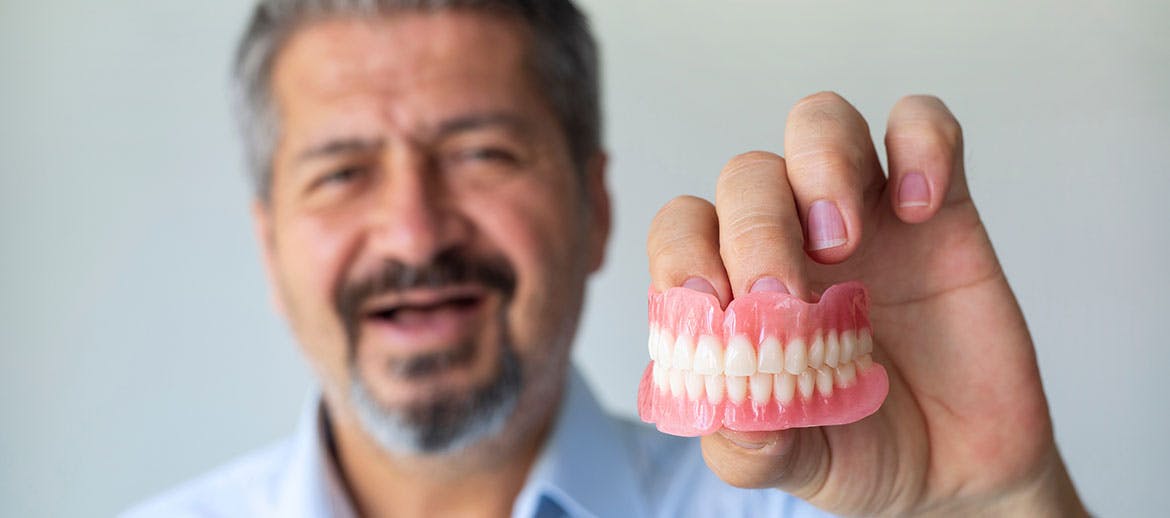Dealing with Ill-Fitting Dentures

Whether you’ve worn dentures for years or you’ve only recently gotten fitted for your first pair, it’s important to make sure that they’re doing their job to help you chew, smile, and talk properly. Part of making sure that your dentures are functioning properly is ensuring that they fit properly. Ill-fitting dentures aren’t doing anyone any favors—below we’ll walk through how to tell if your dentures aren’t fitting properly and the possible side effects of ill-fitting dentures.
Signs of Ill-Fitting Dentures
Do your dentures feel loose or cause discomfort in your mouth? Do they require a thick layer of adhesive to stay in place? If the answer is yes, you likely have ill-fitting dentures.1 Not quite sure? Noting how much adhesive you have to use is a simple way to identify whether or not your dentures fit properly. Well-fitting dentures often only need a coating of saliva to stay firmly in place in the mouth.1 If you have to apply so much adhesive that it oozes off the denture and into your mouth when your dentures are in place, you are using too much adhesive and your dentures may be ill-fitting.1 When used with properly-fitted dentures, a 2.4 ounce tube of denture adhesive should last for seven to eight weeks when used with a full set of dentures.1 If you suspect you might be overusing adhesive to correct ill-fitting dentures, use a calendar to track your denture adhesive use and find out how quickly you’re going through a tube.1
If you’ve just started wearing a new pair of dentures, it’s normal for them to feel a little awkward or bulky in your mouth.2 This isn’t a sign that your dentures are ill-fitting; you just have to get used to wearing them.2 If this feeling of awkwardness or bulkiness starts causing discomfort or doesn’t improve over time, talk to your dentist about the fit of your dentures.
Sometimes people feel a difference between the fit of upper dentures and lower dentures. Upper dentures might feel more secure since there’s more natural suction to keep them fixed in place.3 The fit of your lower denture may feel less secure, since it is balanced between the cheeks and the tongue and the lower jaw does less to support it.3 Again, this feeling of wobbliness or awkwardness is normal in the beginning with a new denture. However, if it persists and you’re unable to keep your denture in place when opening your mouth, speak to your dentist.
What Should I Do if I have Ill-Fitting Dentures?
If you start to experience oral discomfort or feel that your dentures are loose in your mouth, talk to your dentist.1 Your mouth and gums may change over time, which can lead to dentures fitting differently.1 As bone and gum ridges naturally shrink or recede, your dentures may begin to fit improperly.2 Your dentist can reline or replace your dentures so that they fit properly and potentially resolve further problems.1
One thing you should never do is trying to repair or adjust your ill-fitting dentures at home.2 Doing so can damage your dentures and wearing a damaged denture can lead to oral health problems.2 Do not use a do-it-yourself repair kit or over the counter glue to try and fix an ill-fitting denture.2 Always bring ill-fitting dentures to your dentist for repairs and adjustments.2 For minor issues and adjustments, your dentist should be able to make the repairs in the office with a same-day turnaround time.2 For more complicated issues, your dentist may need to send your dentures to an expert at a special dental laboratory.2
Potential Complications from Ill-Fitting Dentures
A denture that doesn’t fit properly can lead to discomfort and difficulty eating and talking, but it can also cause more serious complications.3 Mouth sores, infections, and other oral health issues may arise if ill-fitting dentures are not readjusted and corrected.3
Mouth Sores
Leukoplakia
Burning Mouth Syndrome
Mouth sores are painful and uncomfortable lesions that can develop on the gums, tongue, lips, cheeks, or roof of the mouth4 Ill-fitting dentures may cause mouth sores when they rub against tissue and cause irritation.4
Leukoplakia may result from mouth irritation caused by ill-fitting dentures or habits like chewing on the inside of your cheek.5 Leukoplakia are thick patches that come from extra cell growth.5 They are white in color and can appear on the gums, tongue, or inside of the cheeks.
Ill-fitting dentures are a potential cause of Burning Mouth Syndrome (BMS). BMS is a feeling of heat that results from possible nerve damage or allergy to the denture materials.6 It can affect the tongue, lips, palate, and other areas of the mouth.6 With BMS, you may feel the sensation of your mouth burning, but it will not be red or hot to the touch.6 Contact your dentist if you experience any of these symptoms
Have more questions about your new dentures? Check out our full dentures FAQ page and partial dentures FAQ page for more helpful information.
Sources
- Denture Care and Maintenance. ADA. https://www.ada.org/resources/research/science-and-research-institute/oral-health-topics/dentures. Accessed 6/27/2022.
- Removable Partial Dentures. MouthHealthy. https://www.mouthhealthy.org/en/az-topics/d/dentures-partial. Accessed 6/27/2022
- Dentures. Oral Health Foundation. https://www.dentalhealth.org/dentures. Accessed 6/27/2022.
- Mouth Sores and Spots. ADA.
https://www.mouthhealthy.org/~/media/ADA/Publications/Files/ADA_PatientSmart_Mouth_Sores.pdf?la=en. Accessed 6/27/2022. - Leukoplakia. MouthHealthy. https://www.mouthhealthy.org/en/az-topics/l/leukoplakia. Accessed 6/27/2022.
- Burning mouth syndrome. Oral Health Foundation.
https://www.dentalhealth.org/burning-mouth-syndrome. Accessed 6/27/2022.




